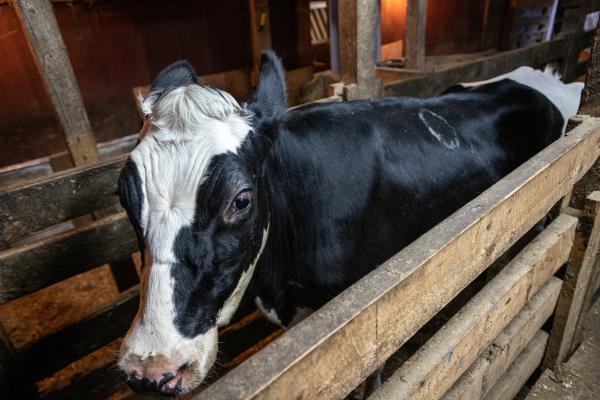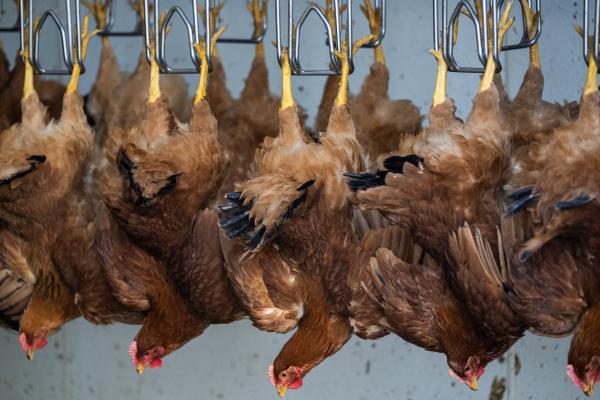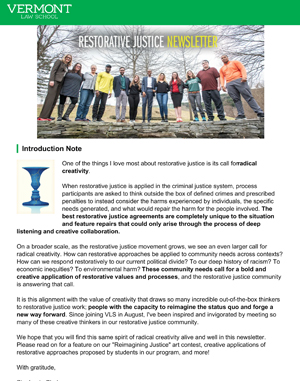
Vermont Law and Graduate School’s Farmed Animal Advocacy Clinic (FAAC) recently drafted comments in support of Animal Partisan’s petition before the U.S. Department of Agriculture’s (USDA) Food Safety and Inspection Service (FSIS). The comments, submitted on behalf of Animal Kind Alliance, Inc., emphasize the importance of the USDA to address critical gaps in the protection of farmed animals, advocating for a more robust and coordinated approach to combating animal cruelty in the agricultural industry.
The scale of animal slaughter in the U.S. is staggering, with over 10 billion slaughtered annually. This translates to more than 20 million land animals killed daily, creating significant opportunities for animal cruelty. Despite longstanding awareness of animal abuse at slaughterhouses, instances of animal cruelty remain rampant. Shockingly, very few instances of animal cruelty in slaughterhouses are prosecuted and the burden to investigate these crimes often falls on nonprofit organizations.
To increase state law enforcement action, a key aspect of the petition requests formal clarification that federal laws do not preempt state anti-cruelty laws at slaughterhouses. While federal laws like the Federal Meat Inspection Act (FMIA) and the Humane Methods of Slaughter Act (HMSA) regulate aspects of animal handling, they do not replace state laws designed to prevent cruelty. The Supreme Court has affirmed that states can impose civil or criminal penalties for animal cruelty without conflicting with federal regulations.
However, confusion persists. State and local authorities often hesitate to act on animal cruelty in federally inspected facilities, mistakenly deferring to federal jurisdiction. This confusion leads to a lack of accountability and continued suffering for animals. The USDA’s clarification, as requested in the petition, would empower state officials to enforce anti-cruelty laws more effectively, closing the jurisdictional gaps that currently allow abuses to go unpunished.
Empowering state and local authorities to enforce anti-cruelty laws offers numerous benefits:
- Enhanced Animal Welfare: With clear guidelines and cooperative enforcement, instances of cruelty can be addressed more promptly and effectively, improving the lives of countless animals.
- Consumer Confidence: Addressing animal cruelty enhances transparency and accountability, fostering greater consumer trust in the food industry.
- Fair Competition: Humane treatment of animals can level the playing field, ensuring that ethical practices are not undercut by inhumane competitors.
- Worker Safety: Reducing animal cruelty can create safer and more ethical working conditions for slaughterhouse employees, mitigating the psychological and physical harms they often face.
- Public Health: Humane handling practices reduce stress in animals, lowering the risk of foodborne illnesses and improving food safety.
- Environmental Protection: Reducing cruelty can decrease the environmental impacts of slaughterhouses, such as pollution and waste, promoting more sustainable practices.

The comment, worked on by FAAC student clinicians Ema Makas JD/MERL’24 and Andrea McMillian JD’24, recognizes the need for jurisdictional clarity to address these interconnected issues. Ema Makas stated, “I was especially motivated to work on this letter, because from the very beginning, I recognized the importance of Animal Partisan’s petition and the potential that the comments in support would have in creating a meaningful difference toward minimizing instances of cruelty in these facilities.”
The USDA’s issuance of a notice clarifying the non-preemptive nature of federal laws and committing to cooperation with state officials is essential. Such a move would not only reinforce the enforcement of anti-cruelty laws but also contribute to the broader goals of animal protection, public health, environmental sustainability, and social justice.


















